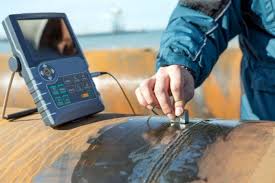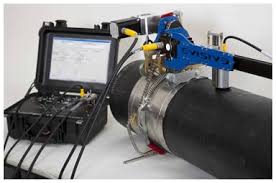Ultrasonic Thickness Gauge Inspection in Egypt: Ensuring Structural Integrity Ultrasonic thickness gauge inspection in Egypt is a ndt compa...
Ultrasonic Thickness Gauge Inspection in Egypt: Ensuring Structural Integrity Ultrasonic thickness gauge inspection in Egypt is a ndt companies critical process for ensuring the structural integrity of various industrial facilities and infrastructure. This non-destructive testing technique allows for precise measurement of the thickness of materials, helping to identify corrosion, erosion, and other potential weaknesses. With the increasing focus on the safety and reliability of structures, ultrasonic thickness gauge inspection has become a vital tool in maintaining the integrity of equipment and pipelines in Egypt. This article will delve into the importance of ultrasonic thickness gauge inspection in Egypt and its role in ensuring the safety and durability of critical infrastructure.
Ultrasonic thickness gauge inspection in Egypt is an essential method for ensuring the structural integrity of various industrial equipment and structures. This non-destructive testing technique uses high-frequency sound waves to measure the thickness of materials, helping to identify corrosion, erosion, and other potential issues that may compromise the integrity of the structure. In Egypt, ultrasonic thickness gauge inspection is commonly used in industries such as oil and gas, petrochemical, power generation, and maritime. This method allows for accurate and reliable measurements to be taken quickly and efficiently, providing valuable data for maintenance ndt level 1 2 3 and integrity assessment purposes. By conducting regular ultrasonic thickness gauge inspections, companies in Egypt can identify potential structural problems early on and take proactive measures to prevent equipment failure or catastrophic incidents. This helps to ensure the safety of workers, protect the environment, and avoid costly downtime and repairs. Overall, ultrasonic thickness gauge inspection plays a crucial role in maintaining the structural integrity of industrial equipment and structures in Egypt, contributing to a safer and more reliable operating environment.
The Importance of Ultrasonic Thickness Gauge Inspection in Egypt

Ultrasonic thickness gauge inspection is essential in Egypt for various industries such as oil and gas, power generation, and manufacturing. This non-destructive testing method helps to assess the thickness of materials, identify corrosion or erosion, and ensure the structural integrity of equipment and infrastructure. In a country with a significant reliance on industries such as oil and gas, the use of ultrasonic thickness gauge inspection is crucial for maintaining safety standards and preventing potential accidents or breakdowns. Additionally, regular inspections can non destructive inspection help prolong the lifespan of infrastructure and equipment, ultimately saving costs for businesses and ensuring the safety of workers and the public.
Advantages of Using Ultrasonic Thickness Gauge Inspection in Egypt
non destructive inspection

Ultrasonic thickness gauge inspection in Egypt offers several advantages. It is a non-destructive testing method that allows for quick and accurate measurements of material thickness. This method can be used on a wide range of materials, including metals, plastics, and composites. It is also portable and can be used in hard-to-reach areas. Additionally, ultrasonic thickness gauge inspection provides immediate results, making it an efficient and cost-effective testing method. This technology is widely used in various industries in Egypt, including manufacturing, construction, and petrochemicals, to ensure the safety and reliability of structures and equipment.
Common Applications of Ultrasonic Thickness Gauge Inspection in Egypt

Ultrasonic thickness gauge inspection is commonly used in Egypt for various applications, including the inspection of pipelines, pressure vessels, storage tanks, and other industrial equipment. It is also widely used in the maritime industry for testing the hull thickness of ships and offshore structures. Additionally, ultrasonic thickness gauge inspection is utilized in the construction and maintenance of buildings and infrastructure to assess the integrity of concrete and metal structures. Moreover, the technology is employed in the oil and gas industry for monitoring the thickness of pipelines and equipment to ensure safety and compliance with regulatory standards. Overall, ultrasonic thickness gauge inspection plays a crucial role in ensuring the structural integrity and safety of various assets and infrastructure in Egypt.
How Ultrasonic Thickness Gauge Inspection Improves Safety in Egypt
Ultrasonic thickness gauge inspection improves safety in Egypt by providing accurate and reliable measurements of material thickness in various industrial applications. This technology allows for non-destructive testing of the strength and integrity of materials, helping to identify potential weak points or areas of wear and corrosion. By detecting any issues early on, ultrasonic inspections help prevent equipment failures, structural collapses, and other safety hazards. This proactive approach to maintenance and safety contributes to the overall improvement of industrial operations in Egypt and helps prevent accidents and injuries.
The Future of Ultrasonic Thickness Gauge Inspection in Egypt
The future of ultrasonic thickness gauge inspection in Egypt is promising as the country continues to invest in infrastructure and industrial development. With the increasing focus on quality control and safety in various industries such as oil and gas, petrochemicals, and power generation, there is a growing demand for reliable inspection techniques. Ultrasonic thickness gauge inspections are widely used for detecting corrosion and determining material thickness in various industrial applications. The technology is non-destructive and provides accurate and reliable results, making it an essential tool for asset integrity management. In Egypt, there is a need for advanced inspection techniques to ensure the safety and reliability of critical infrastructure such as pipelines, pressure vessels, and storage tanks. Ultrasonic thickness gauge inspection can play a pivotal role in addressing these needs by providing valuable data for asset maintenance and decision-making. As the country continues to modernize its industrial facilities and expand its infrastructure, the demand for ultrasonic thickness gauge inspection is expected to grow. This presents opportunities for technology providers and inspection companies to offer their expertise and services in Egypt's evolving market. Overall, the future looks promising for ultrasonic thickness gauge inspection in Egypt as it becomes an integral part of the country's industrial development and safety practices.
Training and Certification for Ultrasonic Thickness Gauge Inspection in Egypt
Training and certification for ultrasonic thickness gauge inspection in Egypt can be obtained through various accredited training providers and certification bodies. These programs typically cover the principles of ultrasonic testing, equipment operation, calibration, and data interpretation. They also include practical hands-on training to ensure proficiency in conducting accurate inspections. Upon completing the training, individuals can obtain certification to demonstrate their competency in utilizing ultrasonic thickness gauges for various inspection applications. These certifications are highly valued in industries such as manufacturing, construction, and oil and gas.
Choosing the Right Ultrasonic Thickness Gauge for Inspections in Egypt
Choosing the right ultrasonic thickness gauge for inspections in Egypt will depend on the specific requirements of the intended application. Factors to consider include the material being tested, the thickness range being measured, the required measurement accuracy, and the environmental conditions present during inspections. For inspections in Egypt, it is important to select a gauge that is suitable for the local operating conditions, such as high temperatures, humidity, and potential exposure to dust or rough handling. Additionally, it is essential to consider the availability of technical support and calibration services within Egypt to ensure the ongoing reliability and accuracy of the instrument. It is recommended to consult with a reputable supplier or manufacturer of ultrasonic thickness gauges to determine the most suitable model for the intended application in Egypt. Additionally, conducting thorough research and seeking recommendations from industry professionals or colleagues who have experience with similar inspections in Egypt can also be beneficial in making an informed decision.

